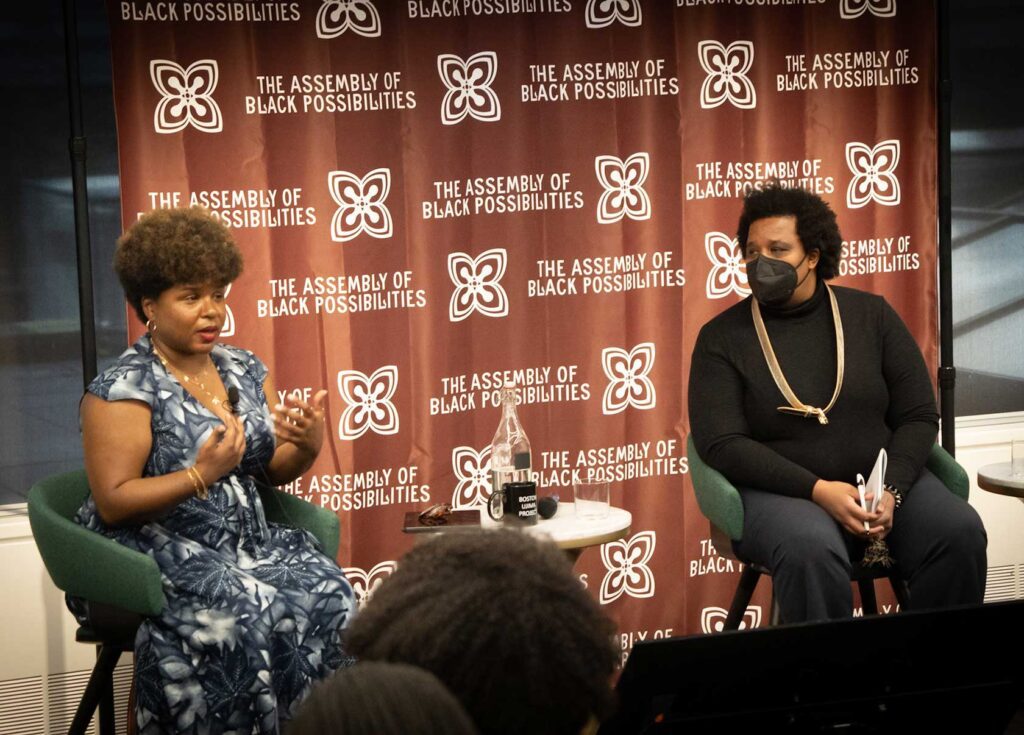
Banner Business Sponsored by The Boston Foundation
Committed to cultivating a community-controlled economy sparked by workers, business owners and investors within Greater Boston neighborhoods, the Boston Ujima Project continues to make good on its promise, years after launching in 2018.
Formally founded in 2017, the Boston-grown initiative awarded its inaugural loan to the award-winning Dorchester-based commercial composting company CERO (Cooperative Energy, Recycling and Organics) Cooperative in 2019. By creating a functioning example for community planning and collaborative decision-making, Ujima hopes to provide communities of color with a roadmap of how to initiate and nurture development using collective investment fed back into their neighborhoods.
With the release of a 2015 Federal Reserve Report that exposed Boston’s massive racial wealth gap, the immediate need for a community-driven economy in the city became more evident than ever. Ujima recognizes that the city possesses “a world of abundance, solidarity, and hope waiting to burst through the cracks in the surface of [the] city’s economy,” its leaders say, and urges the working-class and communities of color to join them in building a local economy truly for the people.
Nia Evans, Ujima’s executive director, explains that “ujima” is Swahili word for collective work and responsibility. The Boston Ujima Project was created, she says, from a common understanding that clear steps towards solutions need to be made with respect to societal issues facing communities in Boston such as racial wealth inequality, poverty, unemployment and displacement.
“We are counteracting years of disinvestment in our communities and filling in gaps in financing for our small businesses,” she says.
Ujima’s governing body reflects the group’s commitment to community, as it is a functioning multi-stakeholder group composed of the very groups — small business owners, impact investors, workers, unions, faiths, civic organizations and others — they aim to serve.
“Every Ujima voting member has an equal vote on the businesses, real estate and other community initiatives we invest in,” Evans says.
With the ability to provide input on Ujima’s investment decisions and community standards, Boston’s working-class populations can confidently pool their resources into this community-controlled capital fund, knowing that they will see a return on their investment.
Neighborhood assemblies in neighborhoods such as Dorchester, Roxbury and Mattapan are a great environment for attacking local issues, while citywide assemblies typically focus on a wider range of issues facing the larger community.
In addition, regularly scheduled member meetings take place on Wednesdays at 7:15 p.m. The public is welcome to sit in on these “#UjimaWednesdays” and receive financial and political education and take part in member working groups, and can also participate virtually via the Boston Ujima Project YouTube channel. These non-hierarchical, member-run groups aim to consistently strengthen community relations by educating the public about their efforts and working to seek out ways to develop and perfect Ujima’s participatory governance structure.
At a time when both public and private funding for locally serving businesses organizations are being slashed left and right, it is essential for communities to lean on and invest in one another.
Evans brings a breadth of knowledge and experience to Ujima, having received a bachelor’s degree in industrial and labor relations from Cornell University and a master’s degree in education leadership, with a course of study in leadership, policy and politics from Teachers College at Columbia University in addition to studying labor relations at the University of New South Wales.
With her rich history in advocacy focusing on eliminating barriers between analysts and people with lived experiences while acknowledging the value of diverse types of expertise in policy, Evans co-created with artist Tomashi Jackson a multimedia policy debate program titled the Frames Debate Project. The project explores the intersection between drug policy, mental health services and incarceration in Massachusetts. Aiming to build cooperative arts, business and investment networks and environments within the city of Boston, Evans joined the team in 2017 working alongside Ujima co-founder Aaron Tanaka, a Boston-based community organizer, grantmaker and impact investor.

Konda Mason and Jessica Norwood address the audience on the State of Black Possibilities during Day 1 of The Assembly of Black Possibilities, held on October 2-3, 2023. PHOTO: UJIMA BOSTON
Since the development of its original concept in 2014 at an event sponsored by City Life/Vida Urbana to learn about community finance, the Boston Ujima Project has expanded to provide a myriad of services to its members, including internal electronic currency with redeemable rewards at certified Ujima businesses as well as access to a time bank, a system that provides a safe means to exchange skills and labor with neighbors, which grows the organization’s network as well as local wealth through the circulation of resources.
With a wide range of members, including youth, non-voting, and supportive solidarity members, Ujima’s community networks have sown deep roots. New opportunities arise with each program, such as the Good Business Alliance, members of which the collective supports by investing and offering creative organizing, technical assistance, cooperative purchasing and support of any initiatives that strengthen operations and market share. Once part of the Alliance, businesses are listed on Ujima’s Good Business Certification and Directory, an online service that helps shine a spotlight on healthy business practices and build a loyal customer base.
The consortium’s connections to those within the Good Business Alliance are uniquely powerful as they are continually evaluating how to be in a positive relationship with the community around them. Through a group of elected individuals on the Community Standards Committee, Ujima is able to ensure that its investments align with the organization’s values and keep those businesses accountable to those they serve by fostering a true connection between businesses and consumers.
Ujima’s partnership with Dorchester-based restaurant Comfort Kitchen is an example. In December of 2022, a $5,000 holiday box effort successfully fortified community relations and proved just how much a bit of financial support can accomplish. A few months following this effort, Ujima reported to their investors that they had successfully “reached quorum on our Comfort Kitchen investment ballot, with members approving a $100,000 loan, and $100,000 line of credit,” showing that truly connecting with those you serve is financially beneficial within a community-controlled economy.
Having started the nation’s first democratic investment fund — which recently reached its investment capital goal of $4.5 million — with a clear purpose of financing small businesses, real estate and infrastructure projects that benefit Boston’s working-class Black, Indigenous and other communities of color, Ujima is able to utilize a combination of participatory budgeting processes and traditional underwritings to put economic development decisions in the hands of community members.
Ujima’s unwavering commitment to working-class Bostonians has led it to firmly divest from extractive industries and, instead, invest capital back into neighborhood businesses, allowing Ujima to grow and learn alongside and within the community it serves.
To find out more about the Boston Ujima Project’s various programs and offerings, visit ujimaboston.com/about.






